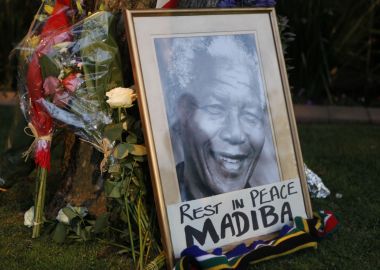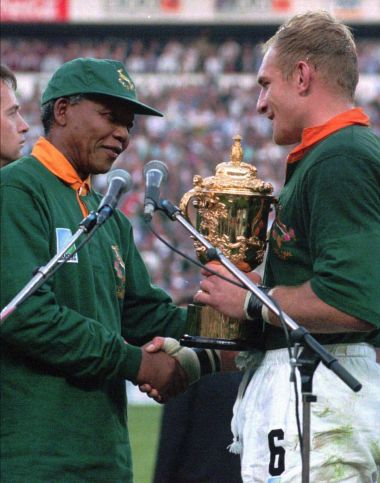Nelson Mandela and his faith

One of Nelson Mandela's famous quotes was also an expression of a deeply Christian idea - "until I changed myself, I could not change others". That expression of being born again, the need for internal revival before one can lead others to their own change, was just one of many expressions of faith Nelson Mandela shared throughout his life.
Although it is almost universally agreed that he was a Christian, his exact denominational allegiances remain a source of discussion. While some have suggested that he was a Jehovah's Witness, as his first wife, his sister, and many relatives around him identified as such, most believe he was a Methodist. He attended a Methodist church school growing up, and was baptised in a small Methodist stone church in the Eastern Cape village of Qunu.
In his autobiography, "The Long Walk to Freedom" he talked of his early experiences with Christianity, praising its engagements with the society around him: "The Church was as concerned with this world as the next: I saw that virtually all of the achievements of Africans seemed to have come about through the missionary work of the Church."
Consequently, while attending the University of Fort Hare, an elite black university in Alice, Eastern Cape, Mandela became a member of the Students Christian Association and taught Bible classes on Sundays in nearby villages.
Among other factors, it was Mandela's Christianity that steered him away from Communism and the class struggle that was spreading into South Africa in the 1940s. Despite befriending Gaur Redebe and Nat Bregman, prominent Xhosa and Jewish South African communists, he could not reconcile communism's atheistic attitudes with his Christian faith. Also, he felt that the idea of class struggle was misleading, and that South Africa's problems were primarily racial in origin. Although he was impressed that the local communist party saw Europeans, Africans, Indians, and those of mixed heritage all mixing equally, he clearly believed there was another way to go.
It is likely that Mandela's Christian faith influenced his strategy during the more militant portion of his protest against the government, when he co-founded the armed resistance group Umkhonto we Sizwe, or "Spear of the Nation" in English. The targets Mandela chose, and the way in which the group timed its attacks, was a clear message that he intended to target the government, not the civilians it claimed to serve.
Rather than bombing densely populated areas, Mandela instead chose to organise acts of sabotage, the first target being an electricity substation. Later attacks would focus on things like the burning of crops, destruction of government offices, damaging government owned factory machines, and blowing up telephone lines. All of this was done at night, so as to avoid civilian casualties. Although Mandela considered that terrorism might be necessary, he did not want to resort to it until other routes had failed.
During his imprisonment on Robben Island, he continued to attend Sunday services, but also took classes on Islam, in what he called "the University of Robben Island". Prisoners would lecture on their subjects of expertise, and Mandela frequently listened to what other students had to say about communism, Islam, and many other subjects. This led to many impassioned debates, but ultimately they equipped him with a greater level of understanding. He also learned to speak Afrikaans in the hope that he could reach out to the guards and convert them to his cause.
At the moment of his release, Mandela once again remembered the importance of internal renewal ahead of external change. "As I walked out the door toward the gate that would lead to my freedom, I knew if I didn't leave my bitterness and hatred behind, I'd still be in prison."
Upon his liberation, Mandela took opportunities to speak at substantial Christian events. Two of these were the Zionist Christian Church's Easter Conferences, once in 1992 and again in 1994. In the latter of these conferences he shared the following:
"The Good News borne by our risen Messiah who chose not one race, who chose not one country, who chose not one language, who chose not one tribe, who chose all of humankind!
"Each Easter marks the rebirth of our faith. It marks the victory of our risen Saviour over the torture of the cross and the grave.
"Our Messiah, who came to us in the form of a mortal man, but who by his suffering and crucifixion attained immortality.
"Our Messiah, born like an outcast in a stable, and executed like criminal on the cross.
"Our Messiah, whose life bears testimony to the truth that there is no shame in poverty: Those who should be ashamed are they who impoverish others.
"Whose life testifies to the truth that there is no shame in being persecuted: Those who should be ashamed are they who persecute others.
"Whose life proclaims the truth that there is no shame in being conquered: Those who should be ashamed are they who conquer others.
"Whose life testifies to the truth that there is no shame in being dispossessed: Those who should be ashamed are they who dispossess others.
"Whose life testifies to the truth that there is no shame in being oppressed: Those who should be ashamed are they who oppress others."
As South Africa's president, Mandela addressed the 8th Assembly of the World Council of Churches in Harare, Zimbabwe in 1998. In his address, he praised the effort of churches in South Africa to end apartheid, and paid tribute to missionaries for bringing high standards of education to Africa from which he benefitted as a child.
"You have to have been in an apartheid prison in South Africa to appreciate the further importance of the church," he told the Assembly.
"They tried to isolate us completely from the outside. Our relatives could see us only once every six months. The link was religious organisations, Christians, Muslims, Hindus and members of the Jewish faith. They were the faithful who inspired us."
He added, "The WCC's support exemplified in the most concrete way the contribution that religion made to our liberation."
Although he clearly was a passionate believer, religion was not something he spoke about publically on many occasions. Given the situation, he was aware that speaking too zealously and too regularly about his religious beliefs could cause partisan division at a time when unity in South Africa was so important.
In his 1994 autobiography, "Long Walk to Freedom", he said: "No one is born hating another person because of the colour of his skin, or his background, or his religion. People must learn to hate, and if they can learn to hate, they can be taught to love, for love comes more naturally to the human heart than its opposite."
He may not have put his faith into so many words, but this mattered little as it was his often simple and humble gestures that so powerfully and clearly conveyed what it was he believed. The words of Francis of Assisi come to mind: "Preach the Gospel and if necessary, use words."

An unforgettable witness to his message of reconciliation came in 1995, when Mandela rallied both blacks and whites to support the Springbok rugby team in the Rugby World Cup. The team had been such a strong symbol of white authority during the apartheid years and it was loathed by black South Africans, who would lend their support to the opposing team.
When the Springboks reached the finals against New Zealand, it was a heart stopping moment when Mandela walked onto the pitch wearing the green Springbok rugby shirt and cap, and shook the hands of the mostly white team.
In the end, it was a stunning victory for South Africa in more ways than winning the Cup. Barriers spanning decades were melted in an instant when black South Africans watching the game on TV heard the largely white crowd in the stadium shout "Nelson", "Nelson".
Not surprisingly, one of the most iconic images in South African and sporting history is that of Mandela presenting Springbok captain Francois Pienaar with the Cup.
Pienaar later recalled their exchange of words in that moment as follows: "He said to me 'Thank you for what you have done for South Africa. I said to him, 'No, Madiba, you've got it wrong. Thank you for what you've done for South Africa.' And I felt like hugging him."
It's clear from these very "human" moments he shared with others, that for Mandela, faith was very much a "doing word", with respect and a desire to always bridge the gap to the other at its heart.
On 10 May 1994, Mandela ended his inaugural presidential speech in Pretoria with "God bless Africa!".
While the words "God bless" are so often carelessly thrown around, it's different when they come from a man as deliberate with his words as Mandela, who had a genuine faith and was so careful to live out everything that he spoke.
As the people of South Africa learn to live without their beloved Madiba in their midst, may God indeed answer that call.











